What are Italian descriptive suffixes?
Let’s start by answering the question: what is a suffix?
You probably already know the answer since you’ve stumbled upon this article, but let’s brush up on the definition of suffix anyway.
A suffix is something you add to a word to change its meaning.
Scrivere → Scrittore
Write → Writer
Illuminare → Illuminazione
Illuminate → Illumination
Now, there are two types of suffixes in Italian:
- Italian suffixes that create words with a completely different meaning (see examples above)
- Italian suffixes that are used to “emotionally describe” a particular word
In this lesson, I’ll teach you the Italian suffixes of the second group, something that has almost no direct counterpart in the English language (think of pig → piglet and duck → duckling, very few examples exist).
Unlike the –let and –ling suffixes, however, these suffixes in Italian are very, very common.
Italian suffixes for all opinions
You’ll probably have heard the words grande and piccolo, brutto and carino. These translate to big, small, ugly and cute, respectively.
What if I told you that there are special Italian suffixes that can be used to describe nouns instead of using an adjective?
Ragazzo → Ragazzone
Boy → Big, tall boy
Gatto → Gattaccio
Cat → Nasty cat
This is a cat, but is this a particularly ugly cat or a particularly cute cat? You can use a suffix to convey how you feel about things!
Imagine: you can “emotionally charge” a noun and give it a new shade of meaning with just a small group of letters.
Yes, Italian suffixes are that powerful, and mastering them is of the utmost importance if you want to start speaking like a native.
Plus, if you like to play creatively with the language like I do, you’ll love testing these Italian suffixes on words you already know.
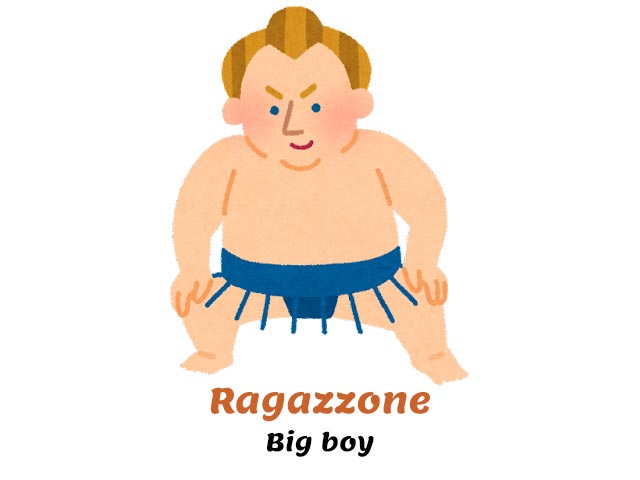
3 grammar rules to remember
Before we start looking at some practical examples of Italian suffixes, I need to give you a few words of caution.
Rule #1
To add an Italian suffix to a word, simply remove the last vowel from that word and add the suffix. It’s that simple.
Rarely, the noun itself will also undergo a change.
Cane → Cagnolino, canino
Dog → Little dog
Sole → Solleone, soleone
Sun → Summer sun
Rule #2
Italian suffixes almost always agree with the number and gender of the noun they are added to.
Therefore, for any given suffix in this lesson, you will find four versions: masculine singular, feminine singular, masculine plural and feminine plural.
Sometimes, however, the noun changes gender:
La palla → Il pallone
The ball → The (big) ball
La scatola → Lo scatolone
The box → The (large) box
Gender change is unpredictable.
Rule #3
Not all random noun + suffix combinations work.
Some words will change their meaning completely:
Bocca → Boccone
Mouth → Mouthful
Torre → Torrone
Tower → Nougat
For some other words, only specific Italian suffixes are allowed:
Micio → Micetto, micione, micino
Micio → Miciaccio
This is also unpredictable, but it is often done for phonetic reasons (miciaccio sounds terrible, for example). If a word already ends in a particular suffix, such as the noun stregone, you can’t really add the –one suffix to it, but have to use an adjective instead.
With practice, using Italian suffixes will become easier.
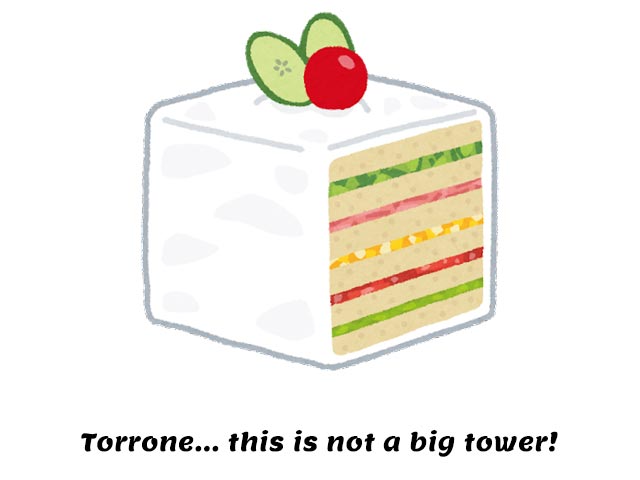
Making things bigger (augmentative Italian suffixes)
This group of Italian suffixes translates into English as big, large, tall.
Whenever you need to convey the message that you think that something or someone is bigger than normal, you can go the old-school route and use an adjective (grosso, alto, grande?), or you can play creatively with the language and use a suffix.
-one, -ona, -oni, -one
Libro, librone
Book, big book
Sorella, sorellona
Sister, big sister
Porta, portone
Door, front gate
Often, –one will be used to convey irony or exaggeration.
Mia nonna ha messo in tavola un piattone di pasta.
My grandma put a huge plate of pasta on the table.
Come to think of it, that may be not be an exaggeration at all. Italian nonna‘s are famous for overfeeding their grandchildren… 😅
Some other times, –one can even be used to express affection.
Al mio micione piace dormire sul davanzale della finestra.
My kitty cat likes to sleep on the windowsill.
It can also be used with certain adjectives as a term of endearment. The adjective itself undergoes a dramatic change.
Furbo, furbacchione
Sly, little sly one
Finally, bacione (big kiss) and bacioni (big kisses) are used as a final greeting in letters and written messages between relatives and friends.
Un bacione!
A big kiss!
Ti mando tanti bacioni!
Sending you many big kisses!
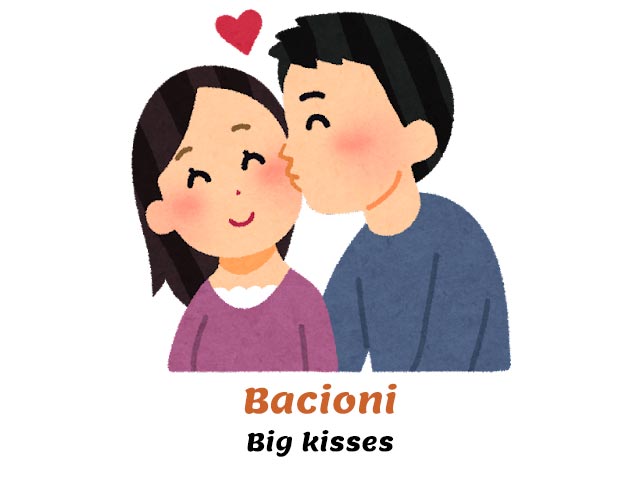
Practice (and context) is king when it comes to suffixes in Italian.
Making things smaller or cuter (diminutive Italian suffixes)
These Italian suffixes are used to denote smallness, but they can also be used as affectionate terms of endearment. They translate into English as small, tiny, cute, cutie, sweet.
-ino, -ina, -ini, -ine
The –ino suffix is by far the most common diminutive suffix in the Italian language.
Uccello, uccellino
Bird, small bird
Paolo, Paolino
(first name)
Tazza, tazzina
Cup, small cup
Sorella, sorellina
Sister, small sister
Elefante, elefantino
Elephant, small elephant
The suffix –ino is commonly used to affectionately refer to the body parts of babies and children.
Dammi la manina, Michele, su!
Hold my hand, Michele, come on!
Literally: Give me your little hand, Michele, come on!
Ma che bel faccino che ha questo bimbo!
What a cute face this little boy has!
Literally: But what nice cutie face this baby boy has!
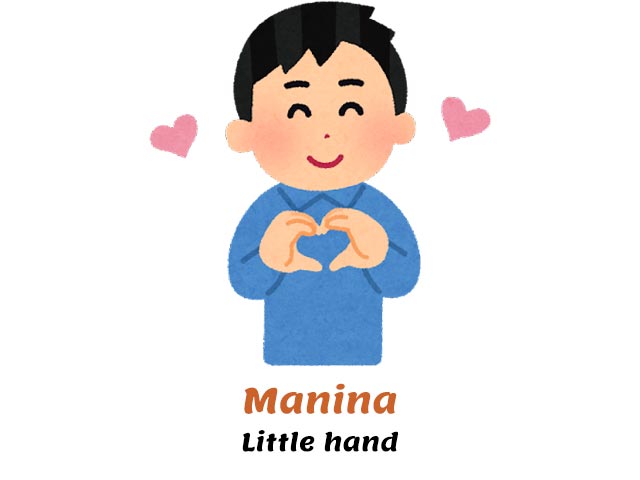
In colloquial speech, the –ino suffix group can also be used to modify adverbs such as poco and tanto, bene and male.
Come va? – Benino, dai.
How’s it going? – Goodish.
Mi serve solo un pochino di fortuna, ecco tutto.
I just need a bit of luck, that’s all.
Some words change their root before adding –ino. Memorization and practice will help you remember them.
Libro, libriccino
Book, small book
Topo, topolino
Mouse, little mouse
Posto, posticino
Place, small place
Cane, cagnolino
Dog, small dog
-ello, -ella, -elli, -elle
Quite common, but not as common as the –ino suffix. If you’re in doubt and have no way to check, use –ino.
Colomba, colombella
Dove, little dove
Mulino, mulinello
Mill, whirlpool
(Note how this completely changes the meaning!)
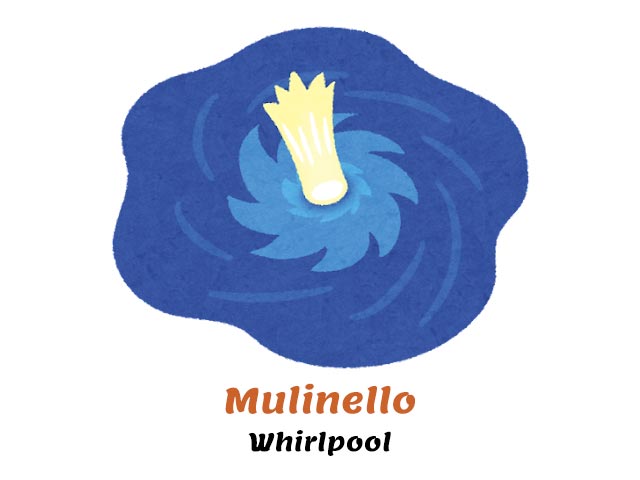
Asino, asinello
Donkey, little donkey
This suffix also causes some words to change their root.
Ramo, ramoscello
Branch, small branch
Albero, alberello
Tree, small tree
Orto, orticello
Vegetable garden, small vegetable garden
-etto, -etta, -etti, -ette
Pretty common suffix that also makes things cuter. Use –ino or –ello for words that already end in –etto (there are quite a few) to avoid awkward sounds.
Fungo, funghetto
Mushroom, little mushroom
Orso, orsetto
Bear, little bear
Borsa, borsetta
Bag, small purse
Gruppo, gruppetto
Group, small group
Biglietto, bigliettino
Ticket, small piece of paper
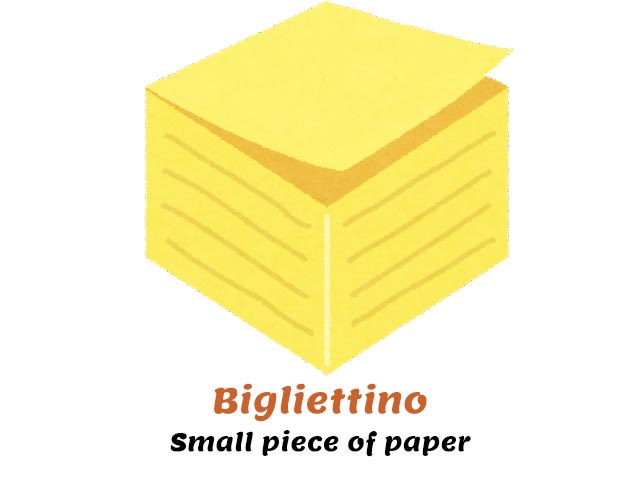
-icciolo, -icciola, -iccioli, -icciole
This suffix is used to make something seem smaller and less important.
Festa, festicciola
Party, small party
Sono andato a una festicciola, ieri sera. Non era granché.
Last night I went to a small party. It was nothing fancy.
-otto, -otta, -otti, -otte
The –otto suffix is often used affectionately.
Giovane, giovanotto
Young boy, youngster
This suffix is often used to describe cute young animals.
Tigre, tigrotto
Tiger, tiger cub
Orso, orsacchiotto
Bear, bear cub
(Note: Small bear → orsetto)
If you remember the examples I used in the –etto suffix section, you’ll have noticed that orso is a noun that allows more than one diminutive suffix: orsetto and orsacchiotto. Many other Italian words behave in the same way, so then again: practice makes perfect!
Lupo, lupacchiotto
Wolf, wolf cub
-uccio, -uccia, -ucci, -ucce
Makes things cozy and tender. It can be used with first names to express affection.
Pietro, Pietruccio
Pietro (first name)
Pino, Pinuccio
Pino (first name)
Caldo, calduccio
Warm, cozy and warm
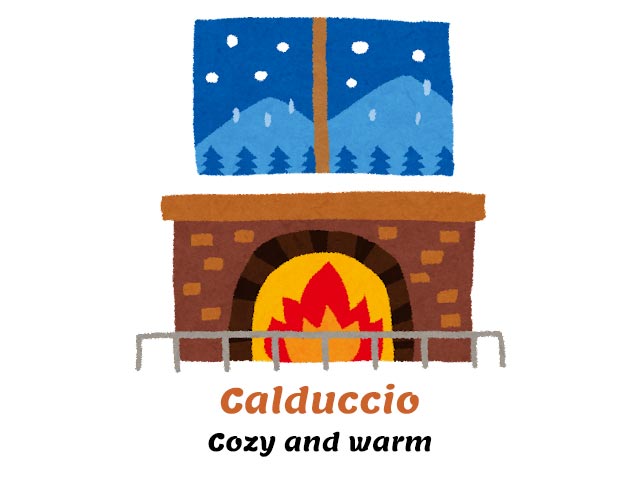
Non vengo con voi stasera. Preferisco starmene qui al calduccio.
I’m not coming with you tonight. I’d rather stay here where it’s cozy and warm.
-uzzo, -uzza, -uzzi, -uzze
Makes things smaller, but not that much cuter. It is also much less common than the other diminutive suffixes.
Paglia, pagliuzza
Straw, little straw
Making things smaller or ugly (derogatory Italian suffixes)
As the heading suggests, these Italian suffixes are used when you want to convey that you don’t like something or someone very much. They translate into English as bad, nasty, wretched.
-accio, -accia, -acci, -acce
Translates as bad, nasty, wretched. This is by far the most common among the derogatory Italian suffixes, so when in doubt about which suffix to use, use this one.
Gatto, gattaccio
Cat, mean and ugly cat
Ragazza, ragazzaccia
Girl, mean girl
Periodo, periodaccio
Period, rough time
Sto attraversando un periodaccio, ultimamente.
I’ve been going through a rough time lately.
-aglia, -aglie
Not very common, mainly because it’s used to address general groups of things or people.
Gente, gentaglia
People, rabble
Ferro, ferraglia
Iron, mass of useless metal
Brodo, brodaglia
Broth, schlop
-astro, -astra, -astri, -astre
Not very common, but it is sometimes added to adjectives to give them a pejorative tone. Colors are an exception.
Furbo, furbastro
Sly person, slimy and cunning person
Bianco, biancastro
White, whitish
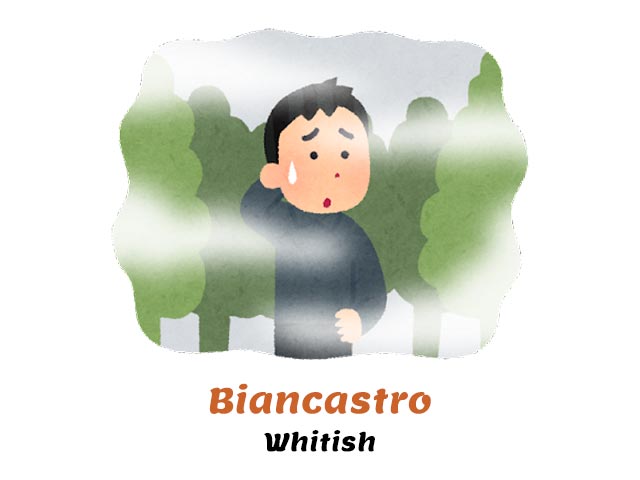
Interestingly, the Italian terms for stepbrother and stepsister use this suffix.
Fratello, fratellastro
Brother, stepbrother
Sorella, sorellastra
Sister, stepsister
Italians have always been some very religious people. In the past, children born out of wedlock were looked down upon and considered second-class. Although things have changed for the better now, fratellastro and sorellastra are remnants of those miserable times.
-iciattolo, -iciattola, -iciattoli, -iciattole
This is used to talk about something small, insignificant and ugly.
Verme, vermiciattolo
Worm, small worm
Mostro, mostriciattolo
Monster, little and unpleasant monster
-ucolo, -ucola, -ucoli, -ucole
This is a rather pejorative suffix. It’s used to refer to something small and insignificant. Ideally you use it to criticize someone’s professional life, eg. you don’t think their job is worthy.
Attore, attorucolo
Actor, no-good actor
Maestro, maestrucolo
Teacher, good-for-nothing teacher
More free Italian resources
You might want to keep learning Italian online with these free Italian resources:
❤️ If you liked this guide on the Italian suffixes, share it with your friends!


